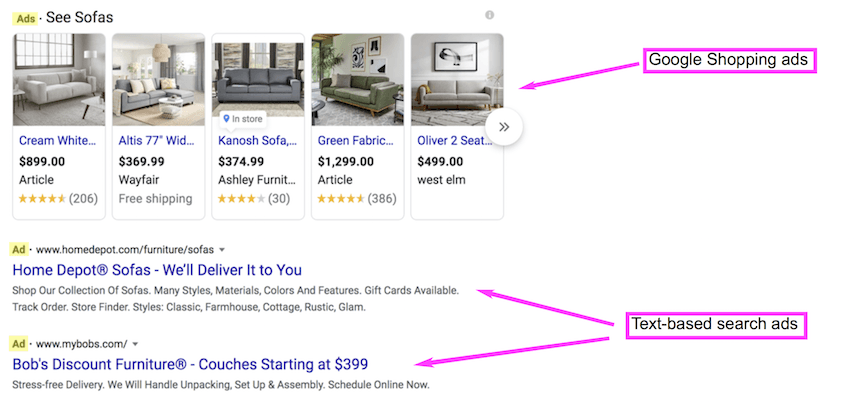-
 11 min. read
11 min. read
-
Summarize in ChatGPT
-
 Sarah Berry
Sarah Berry Lead Web Marketing Consultant
Lead Web Marketing Consultant
- Sarah Berry is a Lead Web Marketing Consultant at one of the largest digital marketing agencies in the USA — WebFX. With more than 10,000 hours of experience, she offers practical insights and strategies to grow your digital revenue. Her work has been cited by Michigan State University, Business Insider, and Ars Technica. When she isn’t polishing her Time Magazine Person of the Year Award, she’s spending time with her flock of ducks.
Table of Contents
- What is performance marketing?
- How does performance marketing work?
- What channels are for performance marketing?
- How is performance marketing different from digital marketing?
- What are the advantages of performance marketing?
- What are the disadvantages of performance marketing?
- Is performance marketing worth it?
- Want to learn more about marketing your business online?
Definition: Performance marketing is a type of digital marketing based on results driven, like clicks or sales. Performance marketing service providers receive payment after meeting specific performance metrics.
With worldwide annual spend on digital advertising surpassing $325 billion, it’s no surprise that different approaches to online marketing are becoming available. One of these new approaches is performance marketing, also called performance media marketing or digital performance marketing.
What is performance marketing? A short performance marketing definition refers to marketing actions and strategies focused on performance.
- What Is Performance Marketing?
- How Does Performance Marketing Work?
- What Channels Are For Performance Marketing?
- How Is Performance Marketing Different From Digital Marketing?
- What Are The Advantages Of Performance Marketing?
- What Are The Disadvantages Of Performance Marketing?
- Is Performance Marketing Worth It?
Keep reading to learn all about performance-based marketing, from how it works to how it compares to digital marketing. Plus, get insight into the benefits and risks of performance marketing and how it can affect your company’s long-term success and profitability.
What is performance marketing?
Performance marketing is an approach to digital marketing or advertising where businesses only pay when a specific result occurs. This result could be a new lead, sale, or other outcome agreed upon by the advertiser and business.
Performance marketing involves channels such as affiliate marketing, online advertising, and sponsored content.
How does performance marketing work?
Although what is performance marketing is quite clear now, the main thing that separates performance marketing from other types of marketing is the way businesses pay for their campaigns. Rather than paying up front or by month, advertisers pay when a specific action takes place. Digital performance marketing focuses on maximizing these outcomes, which may include:
Lead generation
Say your business wants to grab the attention of your target audience to earn leads.
You might enlist a marketing company’s help to bring your branding to more individuals by having these marketers promote your business to prospective customers. The hope is that users will complete a form to learn more about your company and become a lead.
Product or service purchases
Performance media marketing can also focus on generating sales. If you operate a restaurant, for example, a performance marketer may produce ads or content that highlights the dishes served at your location.
The goal is to motivate consumers to visit your restaurant or make a reservation, resulting in a sale for your company.
Application downloads
Companies with mobile apps can also use online performance marketing to encourage app downloads. Apps are common among businesses in a myriad of industries, including technology, food, ecommerce, and more. Performance marketers can promote your app to generate downloads.
These downloads can lead to more sales and revenue for your business.
Other metrics
The outcomes a performance marketing campaign can target aren’t limited to these three options. They can be anything, as long as the advertiser and the business being marketed agree to the terms. Be careful to choose metrics that are meaningful to your business goals.
Website traffic, for example, might be helpful but might not translate directly into sales.
What channels are for performance marketing?
Performance marketing may involve using various types of digital marketing and advertising channels, including the following.
Display ads
Display ads include banner ads and other types of visual advertisements that display on websites your audience visits. These ads typically include a visual element with copy and link to a landing page where users may convert into leads or customers. Using online advertising platforms such as Google Ads, you can target your ads to users whose interests, demographics, or online activity matches those of your target audience.
Under the performance marketing model, you would only pay when someone clicks on your ad, converts on your landing page, or takes another pre-determined action. 
Questioning the quality of your SMB’s PPC performance?
Get your FREE PPC audit from WebFX today!


Sponsored content
Sponsored content combines aspects of online advertising and content marketing. It involves creating content such as a blog post or video and paying for its inclusion on a website that regularly publishes similar content.
A piece of sponsored content will look similar to the rest of the content on the website but will include some indication that it’s sponsored. With performance marketing, you would pay a pre-determined amount when someone clicks on your sponsored article or clicks through to your website from the article, for instance.
Social media advertising
With social media ads, you can reach a broader audience on social media. Social media advertising offers various ad formats, payment models, and targeting options.
Like with other types of online advertising, you can target specific types of users with your social media ads. Advertising allows you to reach more of your followers as well as users who don’t follow you. 
Search engine advertising
You can also place ads on search engines.
These ads are excellent for increasing online visibility since more than 90% of online experiences begin with a search engine. Search engine ads appear at the top of search engine results pages (SERPs). These ads are typically text-only, but Google Shopping ads, which include an image, can also show on SERPs.
Search ads will have some sort of indication that they’re an ad. With digital performance marketing and search engine advertising, you only pay when someone clicks your ad, converts on your landing page, or takes another desired action. 
Affiliate marketing
Affiliate marketing is a type of online marketing in which an individual or company receives payment for sending new leads or customers to a business’s website.
How does affiliate marketing work? An individual or company, known as the affiliate or publisher, promotes another company’s product or service. The affiliate promotes these products or services by linking to them or placing ads for them on their website.
The affiliate then receives a commission for every click, lead, or sale generated by the links or ads on their site. For example, if you run a recipe blog, you might have an affiliate marketing agreement with a company that sells herbs and spices. When one of your recipes calls for a product the company makes, you could link to the product’s page on their website.
How is performance marketing different from digital marketing?
Digital marketing is marketing or advertising that uses online channels.
Performance marketing is a type of digital marketing that uses a payment model in which you only pay when a certain outcome occurs. Digital marketing, also called online or Internet marketing, is a broad term that encompasses various strategies, channels, and payment models. Performance marketing can involve various channels and strategies as well, but it’s defined by the payment model used.
Using this approach, however, may lead to other differences as well. For example, performance marketing campaign goals are typically shorter-term and focus on easy-to-measure metrics like leads generated rather than goals such as increased brand awareness.
We foster and form long-term partnerships so that your business has long-term results.
Over 90%
What are the advantages of performance marketing?
Now that you know what performance marketing is, let’s discuss its potential benefits and drawbacks. When it comes to performance marketing, businesses use it for a few reasons, including:
1. Experience real-time ROI measurements
With performance marketing, it’s easy to track and measure your results, like with other types of digital marketing. Every time a user clicks on your ad, signs up for your email subscription list, or engages in any action that you set out to achieve, you’ll know you fulfilled your goal immediately. That makes keeping track of your return on investment (ROI) at any given moment easy and straightforward.
You’ll also know how much you’re financially responsible for when it comes to paying for your performance marketing campaign.
2. Optimize KPIs
Your key performance indicators (KPIs) play a vital role in your company’s ability to achieve its goals. Whether your KPIs consist of your customer turnover rate or your percentage of sales from new clients, performance marketing allows you to target these metrics directly. Since performance marketers are focused on driving higher performance levels for your business, you can optimize your clicks, impression, leads, and various other performance markers.
It’s worth mentioning that KPIs are a part of other kinds of digital marketing too. When you partner with a web marketing agency, you discuss what your company wants to achieve with Internet marketing. This discussion includes a review of your KPIs, which your dedicated account manager can use when setting marketing goals.
3. Pay as you go
Rather than paying an upfront cost for your services, performance marketers charge your business every time your designated action occurs. Smaller companies often like this model because, with the right approach, it’s friendly to smaller budgets.
What are the disadvantages of performance marketing?
Performance marketing also comes with several disadvantages and risks, especially if you don’t use the right strategies or work with a reputable agency. The risks and disadvantages of performance marketing include:
1. Vanity metrics
Vanity metrics are metrics that appear to be beneficial but don’t have a meaningful impact on your business’s primary goals. For example, increased website traffic or a growing follower list on Twitter might seem like a significant improvement. If it doesn’t lead to increased sales or revenue, though, this metric isn’t the most important metric to track.
That’s not to say that increased web traffic and other similar metrics can’t lead to increased revenue, but it’s important not to make them the end goal. Avoiding vanity metrics is especially important with performance marketing. You don’t want to pay for an increase in a metric that won’t lead to increased revenue.
This situation is what can lead to performance marketing costs outweighing the return.
2. High costs
When you partner with a trusted digital marketing agency, your costs are consistent and predictable. Each month, you know what your company will pay, which can ensure your business adheres to your marketing budget. In a performance marketing campaign, however, your monthly costs can vary widely.
A significant jump in costs can cause issues, especially if the campaign doesn’t lead to increased revenue immediately, such as with leads or ad clicks. Since you’re paying for each sale, you could also end up paying more for the same results than you would with other types of digital marketing.
3. Fraudulent results
If you don’t work with a reputable agency, you open yourself up to the risk of fraud. For unscrupulous companies, the incentive for fraud is especially high with performance marketing. As these agencies rely on results for payment, it can push them to create or drive low-value results.
For example, if you’re unfamiliar with online marketing, an agency may convince you to focus on vanity metrics. With black-hat tactics, an agency could drive a substantial amount of traffic to your site. As they’ve accomplished your marketing goal, they can receive payment.
That traffic, however, doesn’t result in sales or revenue for your business. Due to this downside of performance marketing, companies must adopt a proactive approach to monitoring their campaigns. You must confirm that your agency is working for you and not just themselves.
Good agencies have more than 50 testimonials. Great agencies have more than 100 testimonials.
WebFX has over
1,100+
glowing client testimonials

Is performance marketing worth it?
While performance marketing offers some benefits, including an attractive pricing model for certain businesses, it poses numerous risks as well. If your company’s thinking about performance marketing, you need to weigh these downsides against potential gains. It’s also critical to think about your short- and long-term goals when it comes to your business.
Focusing on immediate results rather than taking an aerial view of your company’s growth can result in an unsustainable model that won’t survive market downturns. That’s why it’s important to develop a comprehensive digital marketing strategy rather than just focusing on one aspect of online marketing, such as performance marketing. When you partner with a reputable, experienced Internet marketing agency, they can create a long-term road map for your company’s success.
With WebFX, you’ll also work one-on-one with a dedicated team of marketers that invest themselves into your success today and tomorrow, which can make a significant impact on your company’s future.
Want to learn more about marketing your business online?
Get more information about marketing your company online by checking out our library of marketing guides, which can help you and your team choose the right type of marketing and learn how to hire a marketing firm that aligns with your needs. If you want to work with a performance marketing agency that cares about you and your business like their own, WebFX is here for you. Contact us online or give us a call at 888-601-5359!
-
 Sarah Berry is a Lead Web Marketing Consultant at one of the largest digital marketing agencies in the USA — WebFX. With more than 10,000 hours of experience, she offers practical insights and strategies to grow your digital revenue. Her work has been cited by Michigan State University, Business Insider, and Ars Technica. When she isn’t polishing her Time Magazine Person of the Year Award, she’s spending time with her flock of ducks.
Sarah Berry is a Lead Web Marketing Consultant at one of the largest digital marketing agencies in the USA — WebFX. With more than 10,000 hours of experience, she offers practical insights and strategies to grow your digital revenue. Her work has been cited by Michigan State University, Business Insider, and Ars Technica. When she isn’t polishing her Time Magazine Person of the Year Award, she’s spending time with her flock of ducks. -

WebFX is a full-service marketing agency with 1,100+ client reviews and a 4.9-star rating on Clutch! Find out how our expert team and revenue-accelerating tech can drive results for you! Learn more
Try our free Marketing Calculator
Craft a tailored online marketing strategy! Utilize our free Internet marketing calculator for a custom plan based on your location, reach, timeframe, and budget.
Plan Your Marketing Budget
Table of Contents
- What is performance marketing?
- How does performance marketing work?
- What channels are for performance marketing?
- How is performance marketing different from digital marketing?
- What are the advantages of performance marketing?
- What are the disadvantages of performance marketing?
- Is performance marketing worth it?
- Want to learn more about marketing your business online?

Proven Marketing Strategies

Proven Marketing Strategies
Try our free Marketing Calculator
Craft a tailored online marketing strategy! Utilize our free Internet marketing calculator for a custom plan based on your location, reach, timeframe, and budget.
Plan Your Marketing Budget
What to read next




